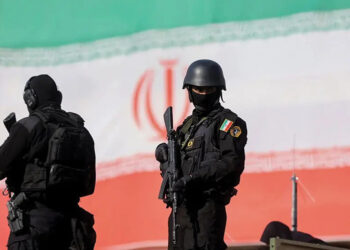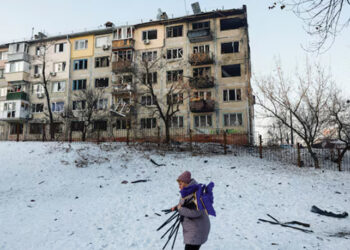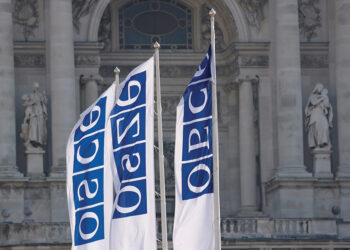Blog by Benyamin Poghosyan, Chairman, Center for Political and Economic Strategic Studies, Yerevan
The trilateral Armenia-Azerbaijan-EU meeting held in Brussels on December 14 and Aliyev- Pashinyan-Macron meeting held on December 15 were significant steps in promoting direct contact between Armenia and Azerbaijan. During the meetings, the sides reaffirmed their readiness to restore the Azerbaijan-Armenia-Nakhijevan and Armenia-Nakhijevan-Iran railways. The release of 10 Armenian POWs agreed during the meeting was another significant confidence-building measure.
However, disagreements remain regarding the legal status of the routes, as Azerbaijan demands access to Nakhijevan via Armenia without passport and customs control implemented by the Armenian side, otherwise threatening to put Azerbaijani checkpoints along the Lachin corridor. Meanwhile, Armenia rejects any attempts to connect the Lachin corridor with the issue of restoring communications between Armenia and Azerbaijan. The sides will probably continue to have different interpretations and perceptions on these issues until the actual launch of the railway connection.
On the EU agenda and the Russia factor
The EU would like to promote stability in the South Caucasus and firmly believes that the launch of economic cooperation between Armenia and Azerbaijan will significantly decrease the possibility of the resumption of large-scale hostilities. This strategy stands behind the EU’s decision to provide up to 2.6 billion Euros in finance to Armenia (200 million grants and 2.4 billion Euros of loans and guarantees for those loans). In this context, the EU and Russia have a similar vision, as the Kremlin is also interested in fomenting the region’s new status quo after the trilateral statement adopted on November 10, 2020.
Unsurprisingly, both the EU and Russia are pushing Armenia and Azerbaijan to start the process of delimitation and demarcation of borders, viewing it as another step towards prevention of new skirmishes and escalations. This is not in Russia’s interests, because unlike Karabakh, now we are talking about incursions into the territory of a CSTO member country that Russia is obliged to protect, and Moscow clearly has no desire to get involved militarily. And it’s in EU’s interests too, because we are talking the essentials of peace and stability here, and it’s the EU’s neighborhood, not to mention that the two sides are both members of the Eastern Partnership. Thus, we should speak about a coordinated Russia – EU policy towards Armenia and Azerbaijan, and not speculate on potential rivalry and the EU attempts to decrease Russia’s involvement in the process. Before and after the Brussels meetings, Charles Michel and President Macron held phone conversations with Russian President Putin, discussing the situation in Nagorno Karabakh and relations between Armenia and Azerbaijan.
There are also some added benefits for both the EU and Russia at the regional level: The Kremlin can boast that as long as its spheres of influence are respected, as long as its agenda is abided to, it can successfully cooperate with the West, and the EU can present itself as a geopolitical actor, something Brussels is always keen on, to boost its own credibility, and have a success story of “Dialogue with Russia” that so many Western leaders are pushing for.
On why Aliyev would want to pursue economic cooperation with Armenia
Any economic cooperation with Armenia is a signal to Baku that relations are starting to normalize, that the Armenian side has accepted the outcome of the 2020 War. And there certainly is no majority view in Armenia that we should rise up and take back land which was lost in 2020. From Aliyev’s perspective, it’s only a matter of time before those 90,000 Armenians either leave, or get used to the new status quo, get Azerbaijani passports, etc. With that, Baku believes that in time, the departure of the Russian peacekeepers will also become an eventuality. So this is in line with Azerbaijani visions that the Karabakh conflict has been solved, at least strategically. And now we can somehow try to normalize our relations.
On Armenian expectations ahead of the meeting and the subsequent reaction
Frankly speaking, I don’t think there was a strategic game changer in Brussels. In Armenia, there was a feeling that this meeting would be focused on only humanitarian issues, the release of the POW’s was definitely expected, as it has almost become a pattern. But few anticipated that there would be more clarity regarding the railways and connectivity issue, so that’s definitely a step forward. After the Sochi meeting, and then the meeting which on December 1 couldn’t be agreed on, there was a sense that the sides wouldn’t be budge on these issues. Very few thought that details would be revealed in Brussels, so in that case, I can say that even the statement published after the trilateral meeting, was a little bit more than was generally expected.
Blog by Benyamin Poghosyan, Chairman, Center for Political and Economic Strategic Studies, Yerevan














